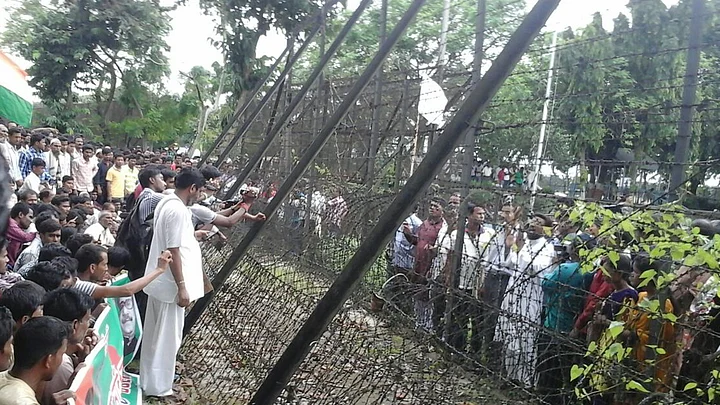Ground Report from the Enclaves
Rustic she may be, but make no mistake, she is nobody’s fool. And, she can pose questions that would leave you groping for an answer. Meet Moymona Khatun, a 40-year-old housewife and peasant from Poaturkuthi, a Bangladeshi enclave that is to merge with India – well soon!
India and Bangladesh ratified the historic Land Boundary Agreement (LBA) on June 6, 2015 during Prime Minister Narendra Modi’s visit to Dhaka. As per the agreement, 51 Bangladeshi enclaves this side of the border would merge with India while 111 Indian enclaves located in Bangladesh would now be part of that country.
For the record keepers, the 51 enclaves that would come India’s way command an area of 7,110 acres and the giveaway enclaves possess an area of 17,160 acres.
As a precursor to the merger exercise, a Joint Boundary Working Group comprising officials of the Census General of both countries and of the Border Security Force and Bangladesh Border Guard would conduct a physical survey of the landmass and population in the enclaves from July 6 to July 16.
Deprived of basic facilities like jobs, education and healthcare for more than fifty years it’s been a long wait for the enclave dwellers. Moymona Khatun asks rather naively, “The 1958 Nehru-Noon Agreement suggested the same remedy to solve the enclave problem. The policy makers are following it now. Meanwhile, 57 years of the enclave dwellers’ lives were wasted. Who is to take responsibility?” The sting in the tail leaves one fumbling for an answer.
To sort out problems arising out of boundary demarcation and enclaves following Partition, Jawaharlal Nehru and his Pakistani counterpart Feroze Khan Noon reached an agreement in 1958 for ‘Exchange of enclaves on the basis of enclaves for enclaves without any consideration of territorial loss or gain’, (Ninth Amendment of Constitution Act, 1960, Article I and Part I of First Schedule). The agreement is known as the Nehru-Noon Agreement.
Trinamool Opposition
“The same tenet was applicable in the September 6, 2011, Manmohan Singh-Sheikh Hasina Treaty, but the BJP and Trinamool Congress (TMC) vehemently opposed a bill on the issue submitted by former External Affairs Minister, Salman Khurshid in November 2013,” points out Diptiman Sengupta, assistant secretary, Bharat Bangladesh Enclaves Exchange Coordination Committee (BBEECC), which has a Bangladesh chapter too.
Ironically, it took a BJP Prime Minister, with West Bengal Chief Minister and TMC Chief Mamata Banerjee in tow, to clinch the long overdue LBA. The compulsions are both political and social.
The enclaves issue is complex. Of the 206 total enclaves including adverse positions (111 Indian and 95 Bangladeshi), 162 are exchangeable. The BBEECC conducted a joint survey of the 162 (51 Bangladeshi and 111 Indian) exchangeable enclaves in June 2010. By its figures, 14,215 people live in the 51 Bangladeshi enclaves and 37,369 people live in the 111 Indian enclaves. Although not official, the BBEECC figures are considered kosher.
“Of the 111 Indian enclaves that would go Bangladesh’s way, 265 families from areas under the Haldibari Police Station, 10 from Mekhliganj Police Station, 22 from Mathabhanga Police Station and 75 from areas under the Dinhata Police Station are likely to relocate to the Indian mainland. The rest, although Indians, prefer to remain with Bangladesh,” Sengupta said.
The current survey is the first concrete step to determine population count in the enclaves and the number of families willing to relocate to either country. For the enclave dwellers rendered ‘nowhere people’ 68 years ago by a quirk of fate, a sigh of relief as they become citizens of a nation at last!
(The writer is a Siliguri-based freelance journalist)
(At The Quint, we question everything. Play an active role in shaping our journalism by becoming a member today.)
